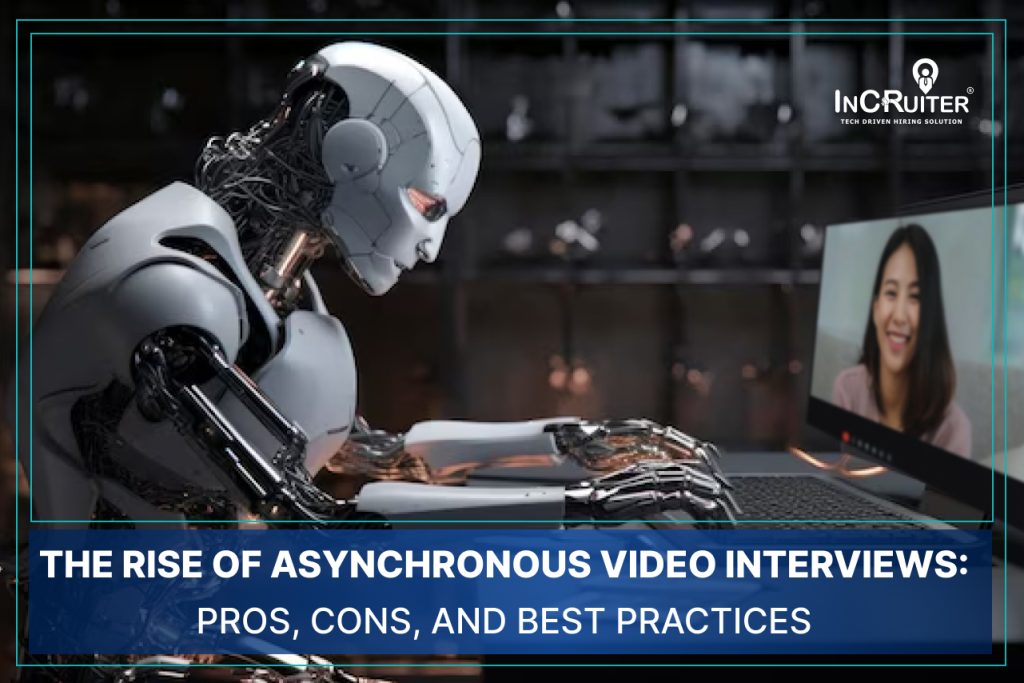
Hiring methods are constantly evolving and for the better. It was in the 2010s when we saw specialized video interview platforms enter the market. Today, we have asynchronous video interviews to make the process all the more effortless.
But what are asynchronous interviews or one-way interviews? In these interviews, candidates respond to pre-recorded questions sent by the recruiter at their own pace. The best part about the method is the flexibility it allows. You can schedule the interview and review responses at your convenience. With asynchronous AI video interviews, you can improve the initial screening process and make it time-efficient.
In this article, we bring you everything you must know about asynchronous video interviews, their pros, cons, and best practices. Let’s dive in!

Pros Of Asynchronous Video Interviews
Without further ado, let’s understand the top three benefits of one-way video interviews.
Offers Flexibility
Did you know? 54% of candidates have abandoned a recruitment process due to poor scheduling and communication. Well, with asynchronous video interview software, that won’t be the case anymore.
It lets candidates participate in the interview at a time that suits them best. This flexibility means varied schedules can be accommodated, and it becomes easier for candidates with other commitments to showcase their skills and qualifications. It also means you won’t miss out on top candidates due to scheduling or communication issues.
Time Efficiency
Using video interviews results in about 50% of time savings in your screening and interviewing process.
When you opt for asynchronous video interviews, applicants can record their responses to interview questions at their own pace. Once the submissions are done, you can review the videos at a time that fits your schedule. This helps you streamline your hiring process as well, which is a plus.
Enhanced Review and Collaboration
Roughly 75% of employees regard collaboration and teamwork as important. It gives you the best results even when it comes to hiring.
When you opt for video interview tools with one-way interviews, hiring teams can collaborate more effectively during the evaluation phase.
The video interview tool provides a centralized platform for multiple team members to review candidates’ responses and share feedback. This lets you build a collaborative environment for a well-informed decision-making process.
Also Read: How Do One-Way Video Interviews Work?
Cons Of Asynchronous Video Interviews
Let’s take a look at some of the cons of asynchronous video interviews.
Lacks The Spontaneity
These interviews may sometimes lack the spontaneity and real-time interaction that occurs during real-time interviews. This absence of immediate back-and-forth conversations may sometimes make it challenging for both candidates and hiring teams to gauge each other’s reactions and build rapport.
More Focus On Presentation Skills
Asynchronous video interviews may unknowingly place more importance on a candidate’s video presentation skills rather than their core qualifications. Candidates who are skilled at presenting themselves on camera might outshine others who don’t possess the same talent.
Best Practices To Conduct Asynchronous Video Interviews

Some of the best practices for conducting one-way interviews are given below:
- Always provide detailed instructions to candidates regarding the interview process.
- Prepare a set of standardized questions to ensure fairness and consistency.
- Offer technical support and troubleshooting assistance to candidates encountering difficulties.
- Train evaluators to focus on candidates’ skills and qualifications rather than on superficial factors like presentation style.
- Provide timely feedback to candidates to maintain engagement and transparency.
Wrapping Up
The rise of asynchronous video interviews optimizes the hiring process. The flexibility and time efficiency are notable pros that bring forth convenience that’s usually lacking in traditional methods. However, to successfully navigate this trend, you need a robust platform by your side and best practices to steer you in the right direction. Remember, to make the most of it, strike a balance between using the benefits and handling the drawbacks for an effective asynchronous interviewing process.
Say Yes To The Future Of Hiring With Asynchronous Video Interviews!
Frequently Asked Questions
Ans: One of the major benefits of asynchronous interviews with a robust interview-as-a-service platform is flexibility. It accommodates all schedules and ensures you don’t miss out on the top candidate.
Ans: If you are a candidate, you can anticipate preset questions whose answers must be submitted via recorded responses. It helps you save time and speed up the screening process.
Ans: Interview-as-a-service platforms like InCruiter are popular for asynchronous interviews and offer user-friendly interfaces, AI-based features, etc.
Ready to Transform Your Hiring Process?
Discover how our AI-powered interview platform can streamline your recruitment and find the best candidates faster.






